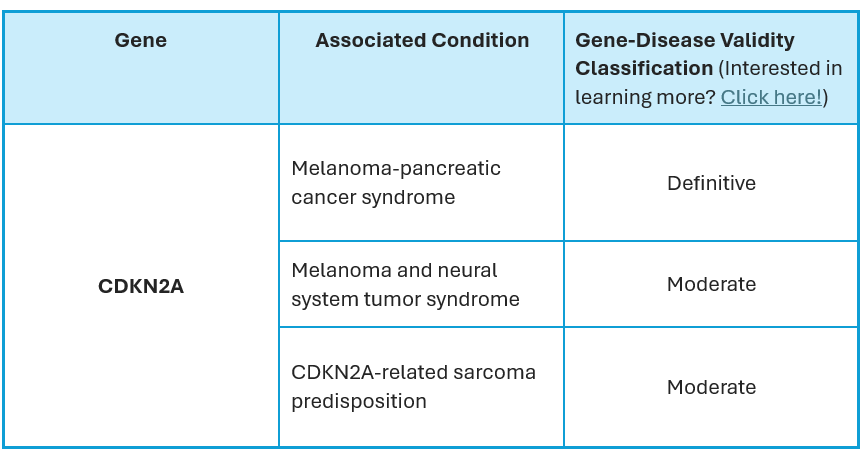
Welcome to the Gene Scene! Each week, we will explore a gene from the ACMG Secondary Findings list—genes identified by the American College of Medical Genetics and Genomics as having clear, actionable health implications.* These genes are included because they’re linked to serious but preventable or manageable conditions when identified early. Here, we focus on the condition that led to the gene’s inclusion on the list, providing clear, relevant information that supports your clinic. To subscribe to the Gene Scene, contact your local GSL or send a request to info@ambrygen.com.
To access the Gene Scene archives, visit our blog.
*GENE SCENE SPOTLIGHT: This gene is not on the ACMG Secondary Findings List, but given CDKN2A NCCN surveillance recommendations and isoform specific implications, we want to spotlight this hereditary cancer gene.
Clinical Phenotype Summary:
Melanoma-pancreatic cancer syndrome (previously known as Familial atypical multiple mole melanoma syndrome or FAMMM) is caused by pathogenic variants in the CDKN2A gene and is inherited in an autosomal dominant manner. The CDKN2A gene is located on chromosome 9p21.3 and encodes the cyclin-dependent kinase inhibitor 2A protein, which gives rise to two isoforms through alternative reading frames: p16(INK4a) (NM_000077.4), which regulates the RB1 cell cycle pathway, and p14(ARF) (NM_058195.3), which functions in the p53 pathway.
Melanoma-pancreatic cancer syndrome is characterized by:
- High total body nevi count (typically >50)
- Atypical nevi with histologic features (e.g., architectural disorder, asymmetry, subepidermal fibroplasia, lentiginous melanocytic hyperplasia)
- Malignant melanoma in one or more first- or second-degree relatives
Affected individuals have a lifetime risk of 28–76% for melanoma and 15–24% for pancreatic cancer, with incomplete penetrance and variable expressivity noted across families. Risk estimates may vary significantly by geographic region and family history.
The p14 and p16 isoforms of CDKN2A have distinct associations with disease. Germline pathogenic variants in the p16 isoform are most frequently associated with melanoma-pancreatic cancer syndrome. Some rare pathogenic variants that impact both p14 and p16 have been reported in association with melanoma and neural system tumors, including brain tumors, neurofibromas, malignant peripheral nerve sheath tumors, and schwannomas. However, risk estimates for these tumors are unclear. In addition, individuals with pathogenic variants in CDKN2A appear to have an elevated risk for sarcomas compared to the general population, although exact risk estimates for this phenotype have not been determined.
Unique Considerations:
Penetrance in melanoma-pancreatic cancer syndrome is incomplete, and significant variable expressivity is observed. Cancer risks can vary widely between individuals and families. Predictive testing may be appropriate for at-risk relatives, even in the absence of personal or family history of cancer or atypical skin findings.
Clinical Resources:
Clinician Management Resource for CDKN2A and Understanding Your Positive CDKN2A Genetic Test Result
Ambry Knows Genes:
Scientific Presentations:
Pancreatic Cancer is More Common than Melanoma in Non-White CDKN2A Positive Individuals (InSiGHT 2024)
Scientific Posters:
Isoform-specific loss of function variants in CDKN2A and their association with cancer phenotypes (ASHG 2025)
Possible founder mutation in CDKN2A in the Latino population (CGA-IGC 2019)
To read more about Ambry’s research on this gene. Visit the "Our Research" dropdown on our website https://www.ambrygen.com/science.
Citations:
• Bui NQ et al. Clin Sarcoma Res. 2019;9:12 PMID: 31528332
• Sargen MR et al. JAMA Dermatol. 2023 Oct;159(10):1112-1118 PMID: 37585199
• Chan SH et al. Hered Cancer Clin Pract. 2021 Mar;19(1):21 PMID: 33766116
• Mirabello L et al. JAMA Oncol. 2020 May;6(5):724-734 PMID: 32191290
• Hruban RH et al. Adv Surg. 2010;44:293-311 PMID: 20919528
• Canto MI et al. Gut. 2013 Mar;62(3):339-347 PMID: 23135763
• Klatte DCF et al. J Clin Oncol. 2022 Oct 1;40(28):3267-3277 PMID: 35658523
• McWilliams RR et al. Eur J Hum Genet. 2011 Apr;19(4):472-478 PMID: 21150883
• Cust AE et al. J Med Genet. 2011 Apr;48(4):266-272 PMID: 21325014
• Bishop DT et al. J Natl Cancer Inst. 2002 Jun;94(12):894-903 PMID: 12072543
• Begg CB et al. J Natl Cancer Inst. 2005 Oct;97(20):1507-1515 PMID: 16234564
Ambry Genetics Gene-Disease Validity Scheme
Each week, we explore a gene from the ACMG Secondary Findings list—genes identified by the American College of Medical Genetics and Genomics as having clear, actionable health implications. These genes are included because they’re linked to serious but preventable or manageable conditions when identified early.
To learn more about the ACMG Secondary Findings list, click here.
To read all previous Gene Scene emails, click here.




